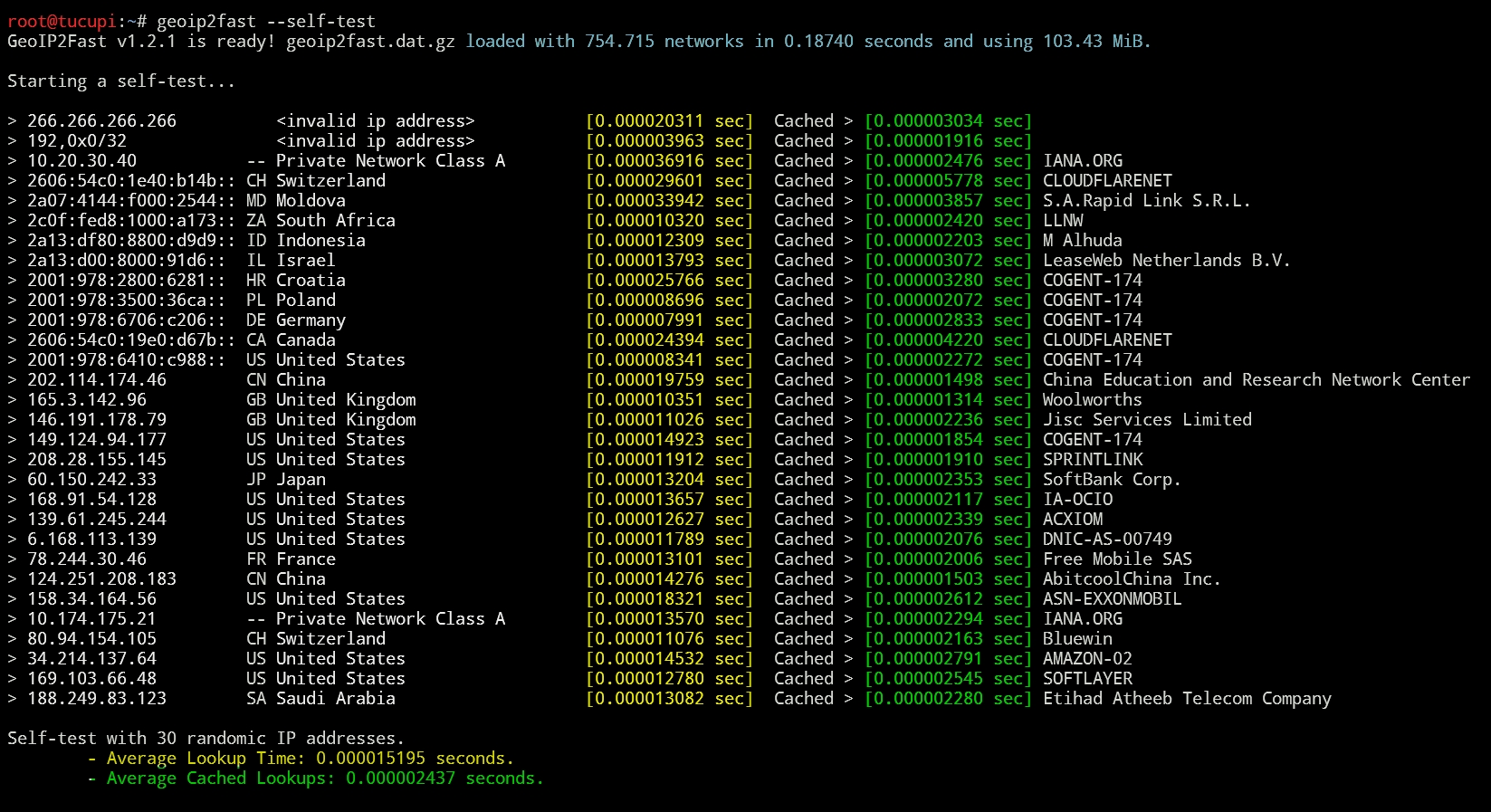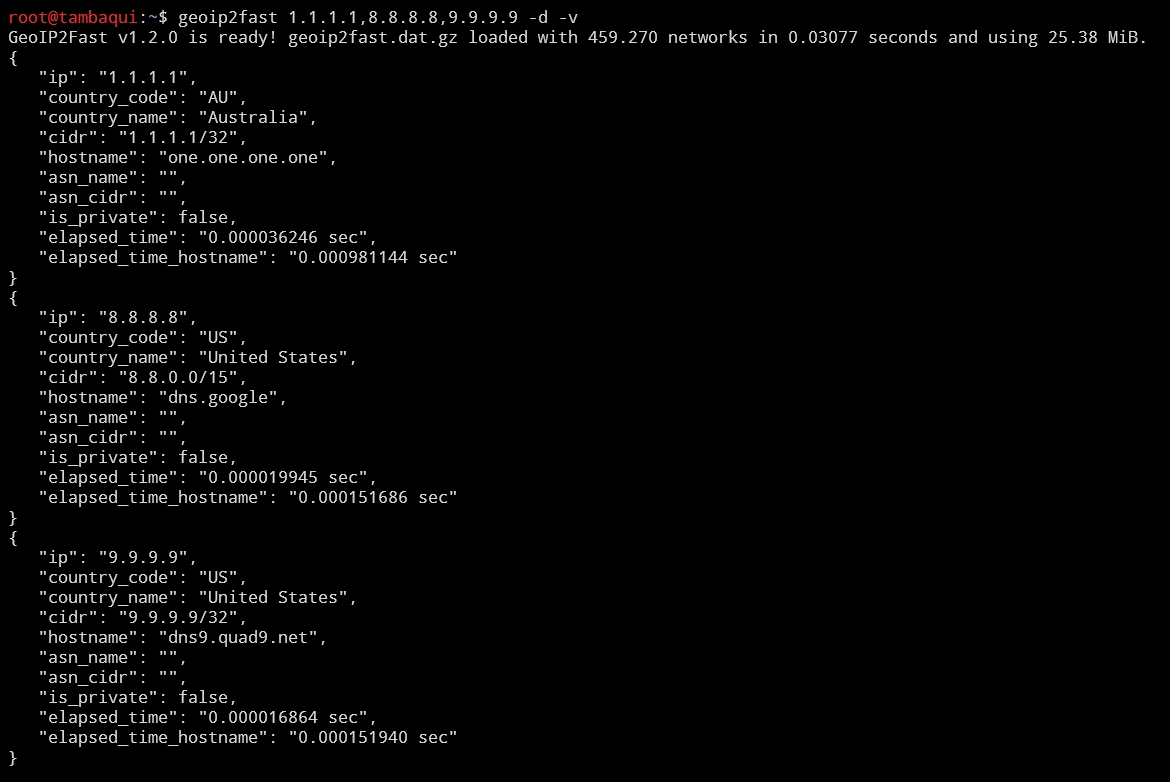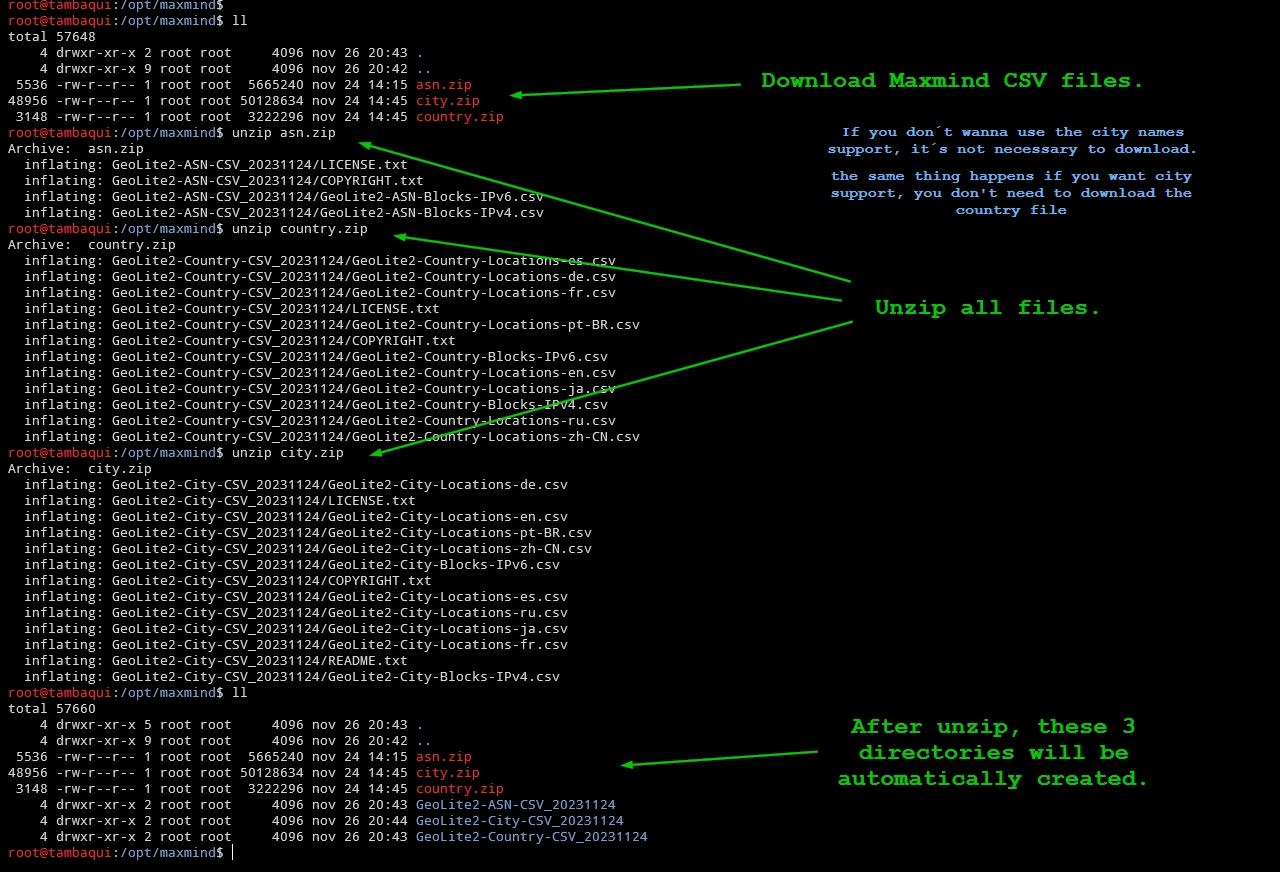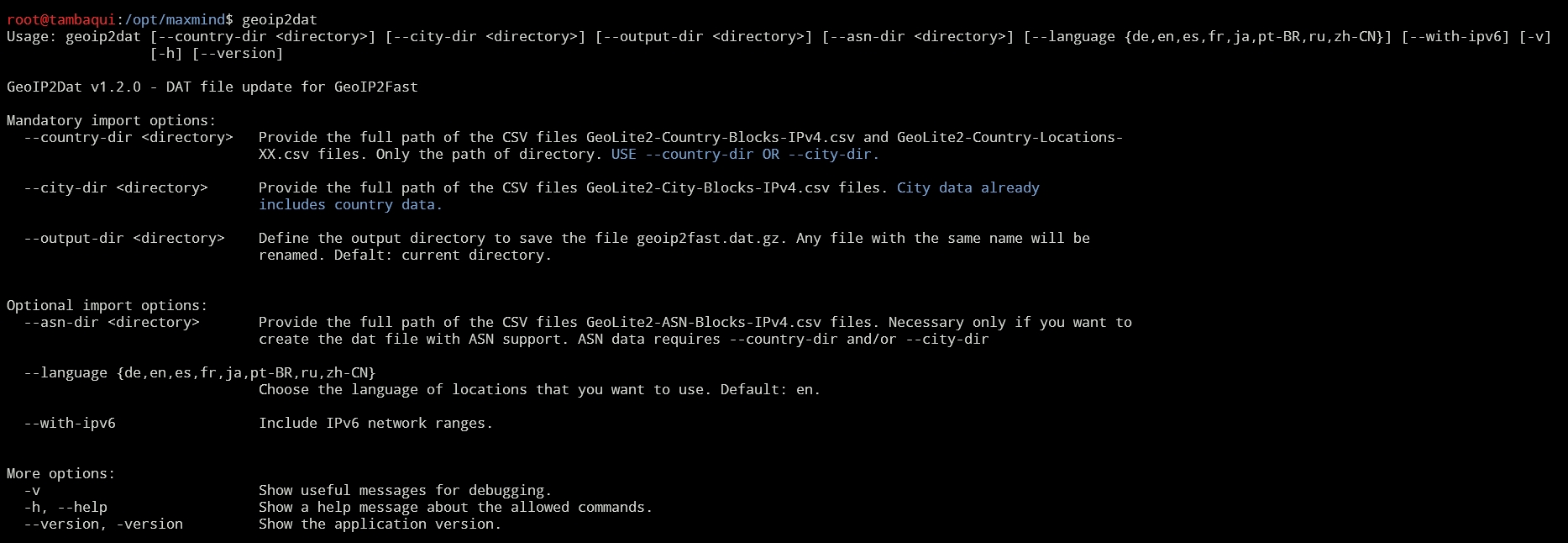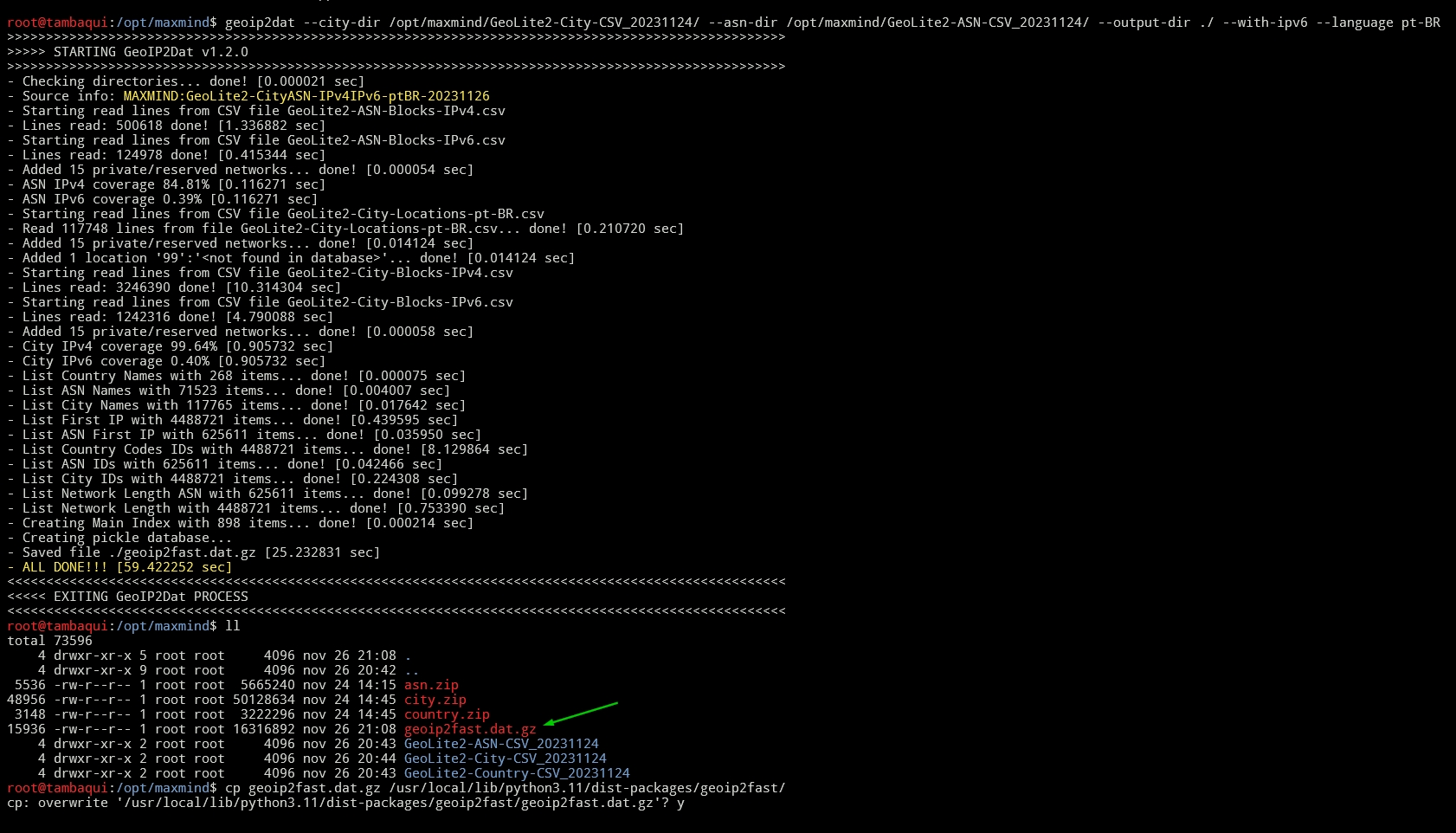GeoIP2Fast is the fastest GeoIP2 country/asn lookup library that supports IPv4 and IPv6. A search takes less than 0.00003 seconds. It has its own data file updated with Maxmind-Geolite2-CSV and is Pure Python!
Project description
GeoIP2Fast v1.1.2
GeoIP2Fast is the fastest GeoIP2 country/asn lookup library. A search takes less than 0.00003 seconds. It has its own data file updated with Maxmind-Geolite2-CSV, supports IPv4 and IPv6 and is Pure Python!
With it´s own datafile (geoip2fast.dat.gz), can be loaded into memory in ~0.07 seconds and has a small footprint for all data, so you don´t need to make requests to any webservices or connect to an external database.
| Content | File Name | File Size | Load Time | RAM Footprint |
|---|---|---|---|---|
| Country IPv4 | geoip2fast.dat.gz |
1.1 MiB | ~0.04 sec | ~24.0 MiB |
| Country IPv4+IPv6 | geoip2fast-ipv6.dat.gz |
1.7 MiB | ~0.09 sec | ~43.0 MiB |
| Country+ASN IPv4 | geoip2fast-asn.dat.gz |
3.1 MiB | ~0.07 sec | ~64.0 MiB |
| Country+ASN IPv4+IPv6 | geoip2fast-asn-ipv6.dat.gz |
4.1 MiB | ~0.15 sec | ~97.0 MiB |
| City+Country+ASN IPv4+IPv6 (beard, hair and mustache) |
not ready yet |
~15 MiB | ~0.80 sec | ~250.0 MiB |
GeoIP2Fast returns ASN NAME, COUNTRY ISO CODE, COUNTRY NAME and CIDR. There is no external dependencies, you just need the geoip2fast.py file and the desired data file .dat.gz. The lookup speed is the same for any data file.
If you call geoip2fast from command line, it´s only use geoip2fast.dat.gz file, so if you want more data like ASN or IPv6 support, you have to copy the respective file over geoip2fast.dat.gz file.
If you are using GeoIP2Fast as a Python library, you don´t need to rename or copy any file, you can load the desired data file in the moment of object creation. Instructions below.
What's new in v1.1.2 - 03/Oct/2023
- DAT files updated with MAXMIND:GeoLite2-Country-ASN-CSV_20231003
- IPv6 transparent support!!! the same class, you just need to choose
which data file you wanna use.
- fast as always! the lookup speed is the same for any data file.
- removed some useless code and put some colored flowers.
What's new in v1.0.6 - 01/Oct/2023
- geoip2fast.dat.gz updated with MAXMIND:GeoLite2-Country-CSV_20230929
- geoip2fast-asn.dat.gz updated with MAXMIND:GeoLite2-ASN-CSV_20230929
- bug fix: Fail on Windows while getting a memory usage
- bug fix: Error when specifying the data file manually
With geoip2fast-asn-ipv6.dat.gz (with country, asn and IPv6):
With the traditional geoip2fast.dat.gz (only country, no asn, no IPv6):
Installation
pip install geoip2fast
Or cloning from Github
git clone https://github.com/rabuchaim/geoip2fast.git
python geoip2fast/setup.py
How does it work?
GeoIP2Fast has 4 datafiles included. Tha main file is geoip2fast.dat.gz with support Country lookups and only IPv4. Usually, these files are located into the library directory (/usr/local/lib/python3/dist-packages/geoip2fast), but you can place it into the same directory of your application. The library automatically checks both paths, And the directory of your application overlaps the directory of the library. You can use an specific location also.
The bisect() function is used together with some ordered lists of integers to search the Network/CountryCode (Yes! an IP address has an integer representation, try to ping this number: ping 134744072 or this ping 2130706433 ).
If GeoIP2Fast does not have a network IP address that was requested, a "not found in database" error will be returned. Unlike many other libraries that when not finding a requested network, gives you the geographical location of the network immediately below. The result is not always correct.
There are network gaps in the files we use as a source of data, and these missing networks are probably addresses that those responsible have not yet declared their location. Of all almost 4.3 billion IPv4 on the internet, we do not have information on approximately 20 million of them (~0,47%). It must be remembered that the geographical accuracy is the responsibility of the network block owners. If the owner (aka ASN) of the XXX.YYY.ZZZ.D/24 network range declares that his network range is located at "Foo Island", we must believe that an IP address of that network is there.
Don't go to Foo Island visit a girl you met on the internet just because you looked up her IP on GeoIP2Fast and the result indicated that she is there.
Quick Start
Once the object is created, GeoIP2Fast loads automatically all needed data into memory. The lookup function returns an object called GeoIPDetail. And you can get the values of it's properties just calling the name of proprerty: result.ip, result.country_code, result.country_name, result.cidr, result.is_private, result.asn_name and result.elapsed_time. Or use the function to_dict() to get the result as a dict. You can get values like result.to_dict()['country_code']
At the moment of creation, you can define which data you want to use. Country+IPv4, Country+IPv4+IPv6, Country+ASN+IPv4 or Country+ASN+IPv4+IPv6. If don´t specify any file, the default geoip2fast.dat.gz will be used.
from geoip2fast import GeoIP2Fast
GEOIP = GeoIP2Fast()
result = GEOIP.lookup("200.204.0.10")
print(result)
# to use the country_code property
print(result.country_code)
# to print the ASN name property
print(result.asn_name)
# Before call the function get_hostname(), the property hostname will always be empty.
print("Hostname: "+result.hostname)
result.get_hostname()
print("Hostname: "+result.hostname)
# to work with output as a dict, use the function to_dict()
print(result.to_dict()['country_code'],result.to_dict()['country_name'])
# to check the date of the CSV files used to create the .dat file
print(GEOIP.get_source_info())
# info about internal cache
print(GEOIP.cache_info())
# clear the internal cache
print(GEOIP.clear_cache())
# to see the difference after clear cache
print(GEOIP.cache_info())
There is a method to pretty print the result as json.dumps():
>>> result = MyGeoIP.lookup("100.200.100.200")
>>> print(result.pp_json())
{
"ip": "100.200.100.200",
"country_code": "US",
"country_name": "United States",
"cidr": "100.128.0.0/9",
"hostname": "",
"is_private": false,
"asn_name": "T-MOBILE-AS21928",
"elapsed_time": "0.000014487 sec"
}
or simply: result.pp_json(print_result=True)
To see the start-up line without set verbose=True :
>>> from geoip2fast import GeoIP2Fast
>>> MyGeoIP = GeoIP2Fast()
>>> MyGeoIP.startup_line_text
'GeoIP2Fast v1.1.0 is ready! geoip2fast.dat.gz loaded with 433468 networks in 0.04153 seconds and using 23.75 MiB.'
As mentioned, these are the files you can use:
| Content | File Name | File Size | Load Time | RAM Footprint |
|---|---|---|---|---|
| Country IPv4 | geoip2fast.dat.gz |
1.1 MiB | ~0.04 sec | ~24.0 MiB |
| Country IPv4+IPv6 | geoip2fast-ipv6.dat.gz |
1.7 MiB | ~0.09 sec | ~43.0 MiB |
| Country+ASN IPv4 | geoip2fast-asn.dat.gz |
3.1 MiB | ~0.07 sec | ~64.0 MiB |
| Country+ASN IPv4+IPv6 | geoip2fast-asn-ipv6.dat.gz |
4.1 MiB | ~0.15 sec | ~97.0 MiB |
>>> from geoip2fast import GeoIP2Fast
>>> geoip = GeoIP2Fast(geoip2fast_data_file="geoip2fast-asn-ipv6.dat.gz",verbose=True)
GeoIP2Fast v1.1.0 is ready! geoip2fast-asn-ipv6.dat.gz loaded with 721085 networks in 0.15689 seconds and using 96.87 MiB.
>>> geoip.lookup("2a02:26f0:6d00:5bc::b63")
{'ip': '2a02:26f0:6d00:5bc::b63', 'country_code': 'NL', 'country_name': 'Netherlands', 'cidr': '2a02:26f0:6d00::/40', 'hostname': '', 'is_private': False, 'asn_name': 'Akamai International B.V.', 'elapsed_time': '0.000600145 sec'}
>>>
Private/Reserved networks were included in the database just to be able to provide an answer if one of these IPs is searched. When it happens, the country_code will return "--", the "network name" will be displayed in the country_name and the range of that network will be displayed in the cidr property, and the property is_private is setted to True.
>>> from geoip2fast import GeoIP2Fast
>>> geoip = GeoIP2Fast(verbose=True)
GeoIP2Fast v1.1.0 is ready! geoip2fast.dat.gz loaded with 433468 networks in 0.04153 seconds and using 23.75 MiB.
>>>
>>> geoip.lookup("10.20.30.40")
{'ip': '10.20.30.40', 'country_code': '--', 'country_name': 'Private Network Class A', 'cidr': '10.0.0.0/8', 'hostname': '', 'is_private': True, 'asn_name': 'IANA.ORG', 'elapsed_time': '0.000094584 sec'}
>>>
>>> geoip.lookup("169.254.10.20")
{'ip': '169.254.10.20', 'country_code': '--', 'country_name': 'APIPA Automatic Priv.IP Addressing', 'cidr': '169.254.0.0/16', 'hostname': '', 'is_private': True, 'asn_name': 'IANA.ORG', 'elapsed_time': '0.000048402 sec'}
You can change the behavior of what will be returned in country_code property of "private networks" and for "networks not found":
>>> from geoip2fast import GeoIP2Fast
>>> geoip = GeoIP2Fast(verbose=True)
GeoIP2Fast v1.1.0 is ready! geoip2fast.dat.gz loaded with 433468 networks in 0.04153 seconds and using 23.75 MiB.
>>> geoip.set_error_code_private_networks("@@")
'@@'
>>>
>>> geoip.lookup("10.20.30.40")
{'ip': '10.20.30.40', 'country_code': '@@', 'country_name': 'Private Network Class A', 'cidr': '10.0.0.0/8', 'hostname': '', 'is_private': True, 'asn_name': 'IANA.ORG', 'elapsed_time': '0.000060297 sec'}
>>>
>>> geoip.set_error_code_network_not_found("##")
'##'
>>> geoip.lookup("57.242.128.144")
{'ip': '57.242.128.144', 'country_code': '##', 'country_name': '<not found in database>', 'cidr': '', 'hostname': '', 'is_private': False, 'asn_name': '', 'elapsed_time': '0.000008152 sec'}
>>>
You can use it as a CLI also:
# geoip2fast
GeoIP2Fast v1.1.0 Usage: geoip2fast [-h] [-v] [-d] <ip_address_1>,<ip_address_2>,<ip_address_N>,...
# geoip2fast -v 9.9.9.9,15.20.25.30 -d
GeoIP2Fast v1.1.0 is ready! geoip2fast.dat.gz loaded with 433468 networks in 0.10803 seconds and using 65.61 MiB.
{
"ip": "9.9.9.9",
"country_code": "US",
"country_name": "United States",
"cidr": "9.9.9.9/32",
"hostname": "dns9.quad9.net",
"is_private": false,
"asn_name": "QUAD9-AS-1",
"elapsed_time": "0.000041463 sec",
"elapsed_time_hostname": "0.014539683 sec"
}
{
"ip": "15.20.25.30",
"country_code": "US",
"country_name": "United States",
"cidr": "15.0.0.0/10",
"hostname": "<Unknown host>",
"is_private": false,
"asn_name": "ATT-IPFR",
"elapsed_time": "0.000024009 sec"
}
# geoip2fast "2.3.4.5, 4.5.6.7, 8.9.10.11" | jq -r '.country_code'
FR
US
US
# ./geoip2fast.py 8.8.8.8,1.1.1.1,200.204.0.10 -d | jq -r '.hostname'
dns.google
one.one.one.one
resolver1.telesp.net.br
How fast is it?
With an virtual machine with 1 CPU and 4Gb of RAM, we have lookups lower than 0,00003 seconds. And if the lookup still in library´s internal cache, the elapsed time goes down to 0,000003 seconds. GeoIP2Fast can do more than 100K queries per second, per core. It takes less than 0,07 seconds to load the datafile into memory and get ready to lookup. Use verbose=True to create the object GeoIP2Fast to see the spent time to start.
Now some tests are included in the geoip2fast.py file.
Note: Of all tests, only
--coverage [-v]test has IPv6 support. All IPv6 networks has a total of three hundred forty undecillion two hundred eighty-two decillion three hundred sixty-six nonillion nine hundred twenty octillion nine hundred thirty-eight septillion four hundred sixty-three sextillion four hundred sixty-three quintillion three hundred seventy-four quadrillion six hundred seven trillion four hundred thirty-one billion seven hundred sixty-eight million two hundred eleven thousand four hundred fifty-four of possible IPs.
# geoip2fast -h
GeoIP2Fast v1.1.0 Usage: geoip2fast [-h] [-v] [-d] <ip_address_1>,<ip_address_2>,<ip_address_N>,...
Tests parameters:
--self-test Starts a self-test with some randomic IP addresses.
--speed-test Do a speed test with 1 million on randomic IP addresses.
--random-test Start a test with 1.000.000 of randomic IPs and calculate a lookup average time.
--coverage [-v] Shows a statistic of how many IPs are covered by current dat file.
--missing-ips [-v] Print all IP networks that doesn't have geo information.
More options:
-d Resolve the DNS of given IP address.
-h Show this help text.
-v Verbose mode.
-vvv Shows the location of current dat file.
./geoip2fast.py --self-test
# ./geoip2fast.py --self-test
GeoIP2Fast v1.1.0 is ready! geoip2fast.dat.gz loaded with 433468 networks in 0.04153 seconds and using 23.75 MiB.
Starting a self-test...
> 223.130.10.1 -- <network not found in database> [0.000034988 sec] Cached > [0.000001427 sec]
> 266.266.266.266 <invalid ip address> [0.000015505 sec] Cached > [0.000001393 sec]
> 192,0x0/32 <invalid ip address> [0.000001101 sec] Cached > [0.000000881 sec]
> 127.0.0.10 -- Localhost [0.000023153 sec] Cached > [0.000002716 sec] 127.0.0.0/8
> 10.20.30.40 -- Private Network Class A [0.000012335 sec] Cached > [0.000001526 sec] 10.0.0.0/8
> 200.204.0.10 BR Brazil [0.000014939 sec] Cached > [0.000002163 sec] 200.204.0.0/14
> 57.242.128.144 -- <network not found in database> [0.000004927 sec] Cached > [0.000000707 sec]
> 192.168.10.10 -- Private Network Class C [0.000009447 sec] Cached > [0.000001244 sec] 192.168.0.0/16
> 200.200.200.200 BR Brazil [0.000004481 sec] Cached > [0.000001852 sec] 200.200.200.200/32
> 11.22.33.44 US United States [0.000005417 sec] Cached > [0.000001573 sec] 11.0.0.0/10
> 200.147.0.20 BR Brazil [0.000004278 sec] Cached > [0.000001466 sec] 200.144.0.0/14
(.....)
./geoip2fast.py --speed-test
# ./geoip2fast.py --speed-test
GeoIP2Fast v1.1.0 is ready! geoip2fast.dat.gz loaded with 433468 networks in 0.04153 seconds and using 23.75 MiB.
Calculating current speed... wait a few seconds please...
Current speed: 136572.73 lookups per second (searched for 1,000,000 IPs in 7.322106013 seconds) [7.32211 sec]
./geoip2fast.py --coverage
# geoip2fast --coverage
GeoIP2Fast v1.1.0 is ready! geoip2fast.dat.gz loaded with 721085 networks in 0.15230 seconds and using 96.82 MiB.
Use the parameter '-v' to see all networks included in your /opt/pypi-geoip2fast/git-geoip2fast/geoip2fast/geoip2fast.dat.gz file.
Current IPv4 coverage: 99.55% (4,275,547,157 IPv4 in 482940 networks) [0.32381 sec]
Current IPv6 coverage: 0.000019368% (65,907,444,117,979,173,026,986,610,130,944 IPv6 in 238145 networks) [0.32388 sec]
./geoip2fast.py --coverage -v
# geoip2fast --coverage -v
GeoIP2Fast v1.1.0 is ready! geoip2fast.dat.gz loaded with 721085 networks in 0.19229 seconds and using 96.83 MiB.
Use the parameter '-v' to see all networks included in your /opt/pypi-geoip2fast/git-geoip2fast/geoip2fast/geoip2fast.dat.gz file.
- Network: 0.0.0.0/8 IPs: 16777216 -- Reserved for self identification 0.000128794 sec
- Network: 1.0.0.0/24 IPs: 256 AU Australia 0.000073830 sec
- Network: 1.0.1.0/24 IPs: 256 CN China 0.000084977 sec
- Network: 1.0.2.0/23 IPs: 512 CN China 0.000015769 sec
- Network: 1.0.4.0/22 IPs: 1024 AU Australia 0.000015369 sec
- Network: 1.0.8.0/21 IPs: 2048 CN China 0.000023131 sec
- Network: 1.0.16.0/20 IPs: 4096 JP Japan 0.000095840 sec
(.....)
- Network: 2a13:b487:502a::/48 IPs: 1208925819614629174706176 SM San Marino 0.000078384 sec
- Network: 2a13:b487:502b::/48 IPs: 1208925819614629174706176 AW Aruba 0.000059244 sec
- Network: 2a13:b487:502c::/48 IPs: 1208925819614629174706176 AZ Azerbaijan 0.000068962 sec
- Network: 2a13:c007:8400::/38 IPs: 1237940039285380274899124224 TW Taiwan 0.000063862 sec
- Network: 2a13:db01::/36 IPs: 4951760157141521099596496896 AU Australia 0.000067782 sec
- Network: 2a13:db01:1000::/36 IPs: 4951760157141521099596496896 US United States 0.000060046 sec
(.....)
- Network: 2c0f:ffb8::/32 IPs: 1 SD Sudan 0.000014606 sec
- Network: 2c0f:ffc0::/32 IPs: 1 ZA South Africa 0.000014912 sec
- Network: 2c0f:ffc8::/32 IPs: 1 ZA South Africa 0.000020690 sec
- Network: 2c0f:ffd0::/32 IPs: 1 ZA South Africa 0.000019932 sec
- Network: 2c0f:ffd8::/32 IPs: 1 ZA South Africa 0.000027611 sec
- Network: 2c0f:ffe8::/32 IPs: 1 NG Nigeria 0.000026638 sec
- Network: 2c0f:fff0::/32 IPs: 1 NG Nigeria 0.000018937 sec
Current IPv4 coverage: 99.55% (4,275,547,157 IPv4 in 482940 networks) [37.58600 sec]
Current IPv6 coverage: 0.000019368% (65,907,444,117,979,173,026,986,610,130,944 IPv6 in 238145 networks) [37.58602 sec]
./geoip2fast.py --missing-ips
# ./geoip2fast.py --missing-ips
GeoIP2Fast v1.1.0 is ready! geoip2fast.dat.gz loaded with 433468 networks in 0.04153 seconds and using 23.75 MiB.
Searching for missing IPs... (USES 100% OF CPU! - FUNCTION IN TESTS, COULD NOT BE ACCURATE)
From 1.34.65.179 to 1.34.65.179 > Network 1.34.65.180/32 > Missing IPs: 1
From 1.46.23.235 to 1.46.23.235 > Network 1.46.23.236/32 > Missing IPs: 1
From 2.12.211.171 to 2.12.211.171 > Network 2.12.211.172/32 > Missing IPs: 1
(.....)
From 216.238.200.0 to 216.238.207.255 > Network 216.238.208.0/21 > Missing IPs: 2048
From 217.26.216.0 to 217.26.223.255 > Network 217.26.224.0/21 > Missing IPs: 2048
From 217.78.64.0 to 217.78.79.255 > Network 217.78.80.0/20 > Missing IPs: 4096
>>> Valid IP addresses without geo information: 20,012,663 (0.47% of all IPv4) [56.94100 sec]
Some IPs are excluded as described in page "Do Not Sell My Personal Information Requests" at Maxmind website.
GeoIP2Dat - update geoip2fast.dat.gz file anytime
The updates of geoip2fast.dat.gz file will be published once a week on Github https://github.com/rabuchaim/geoip2fast/. You can also create your own dat file whenever you want, see instructions below.
Download the Geolite2 Country CSV files from Maxmind website and place it into some diretory (in this example, was placed into /opt/maxmind/). Extract this zip file into this directory and run geoip2dat to see the options.
The options --country-dir and --output-dir are mandatory. Specify the path of extracted files in --country-dir option. And for --output-dir, put the current path ./.
If you want to add support for ASN data, add the option --asn-dir. And if you want to add IPv6 support, just add --with-ipv6 to your command line.
You can choose the language of country locations. The default is en.
After creation of geoip2dat.dat.gz file, move or copy this file to the directory of your application or to the directory of GeoIP2Fast library. You choose.
From now you don't depend on anyone to have your data file updated. There's no point the code being open-source if you're dependent of a single file.
The Philosophers call it 'Libertas'
Create your own GeoIP CLI with 6 lines
- Create a file named
geoipcli.pyand save it in your home directory with the text below:
#!/usr/bin/env python3
import os, sys, geoip2fast
if len(sys.argv) > 1 and sys.argv[1] is not None:
geoip2fast.GeoIP2Fast().lookup(sys.argv[1]).pp_json(print_result=True)
else:
print(f"Usage: {os.path.basename(__file__)} <ip_address>")
- Give execution permisstion to your file and create a symbolic link to your new file into
/usr/sbinfolder, like this (let's assume that you saved the file into directory /root)
chmod 750 /root/geoipcli.py
ln -s /root/geoipcli.py /usr/sbin/geoipcli
- Now, you just need to call
geoipclifrom any path.
# geoipcli
Usage: geoipcli <ip_address>
# geoipcli 1.2.3.4
{
"ip": "1.2.3.4",
"country_code": "AU",
"country_name": "Australia",
"cidr": "1.2.3.0/24",
"hostname": "",
"is_private": false,
"elapsed_time": "0.000019727 sec"
}
# geoipcli x.y.z.w
{
"ip": "x.y.z.w",
"country_code": "",
"country_name": "<invalid ip address>",
"cidr": "",
"hostname": "",
"is_private": false,
"elapsed_time": "0.000012493 sec"
}
# geoipcli 57.242.128.144
{
"ip": "57.242.128.144",
"country_code": "--",
"country_name": "<network not found in database>",
"cidr": "",
"hostname": "",
"is_private": false,
"elapsed_time": "0.000019127 sec"
}
GeoIP libraries that inspired me
GeoIP2Nation - https://pypi.org/project/geoip2nation/ (Created by Avi Asher)
This library uses sqlite3 in-memory tables and use the same search concepts as GeoIP2Fast (based on search by the first´s IPs). Simple and fast! Until this date, the dump file that cames with pip install is corrupted, so use this link to download the complete SQL dump file http://www.ip2nation.com/ip2nation.zip.
GeoIP2 - https://pypi.org/project/geoip2/ (created by Maxmind)
This is the best library to work with Maxmind (paid subscription or with the free version). You can use http requests to Maxmind services or work with local Maxmind MMDB binary files. Pretty fast too. Sign-up to have access to all files of the free version https://dev.maxmind.com/geoip/geolite2-free-geolocation-data
* Maxmind is a registered trademark - https://www.maxmind.com
TO DO list
- a pure-python version for REDIS with a very small footprint (pure protocol, won´t use any REDIS library) <<< On the way at https://github.com/rabuchaim/geoip2redis
- a GeoIP Server; <<< On the way a docker container, your own GeoIP server inside your network. With rest API or socket (super fast)
- a mod_geoip2fast for NGINX;
- a better manual, maybe at readthedocs.io;
- a version with cities; <<< On the way in GeoIP2Fast for Redis https://github.com/rabuchaim/geoip2redis
- Done in v1.1.0 - IPv6 support.
- Done in v1.0.5 - a version with ASN.
- Done in v1.0.2 - provide a script to update the base. If you have the paid subscription of Maxmind, you can download the files, extract into some directory and use this script to create your own geoip2fast.dat.gz file with the most complete, reliable and updated GeoIP information.
Sugestions, feedbacks, bugs, wrong locations...
E-mail me: ricardoabuchaim at gmail.com
Project details
Release history Release notifications | RSS feed
Download files
Download the file for your platform. If you're not sure which to choose, learn more about installing packages.
Source Distribution
File details
Details for the file geoip2fast-1.1.2.tar.gz.
File metadata
- Download URL: geoip2fast-1.1.2.tar.gz
- Upload date:
- Size: 8.7 MB
- Tags: Source
- Uploaded using Trusted Publishing? No
- Uploaded via: twine/4.0.2 CPython/3.10.12
File hashes
| Algorithm | Hash digest | |
|---|---|---|
| SHA256 | f98cad09c66c98eac8883c0a8563ad725b89cef74cce0eb64ca08193ab052d6a |
|
| MD5 | 6e3022e28b82239af6e22779e232f903 |
|
| BLAKE2b-256 | 6094539fe22177080398afe8832fb1139d0436718eb3e49ef2a642785b0a836a |


